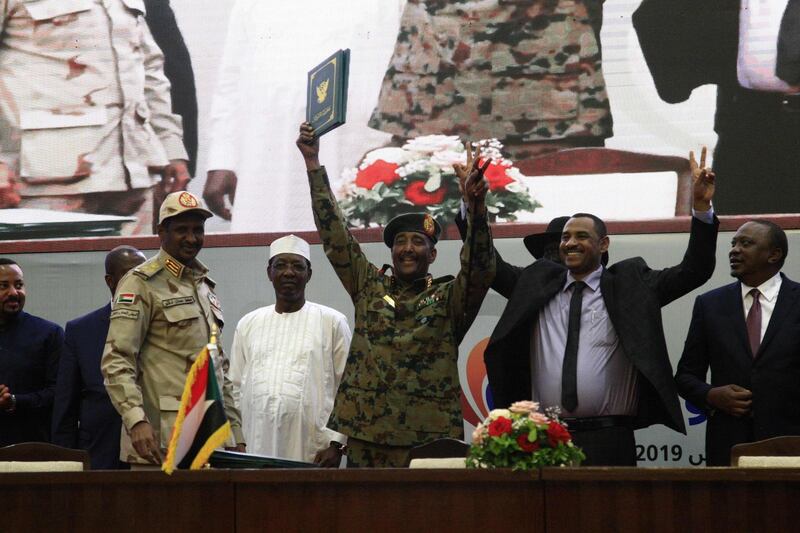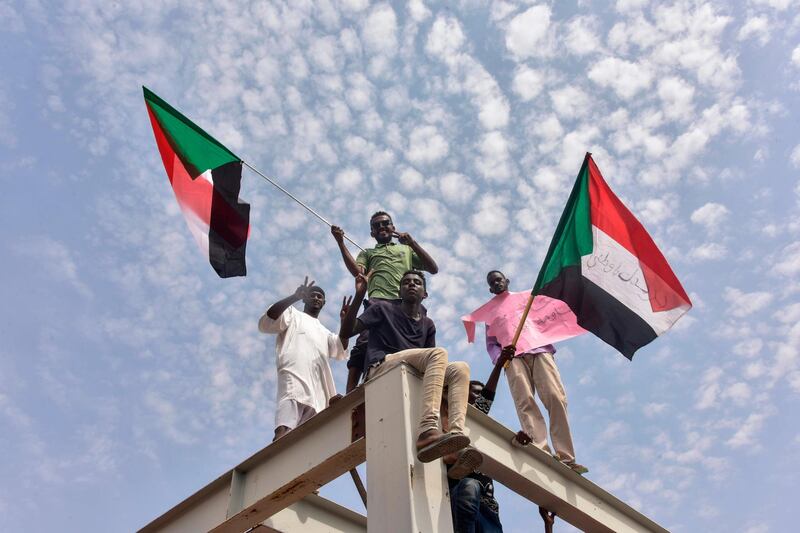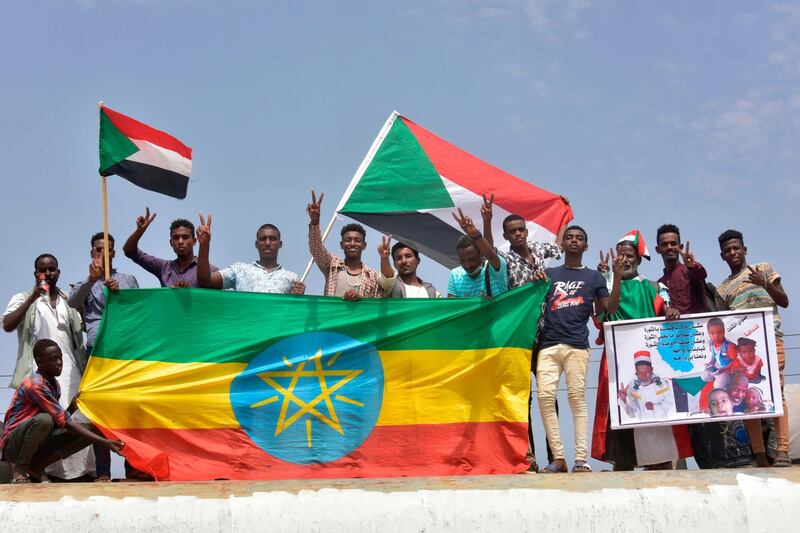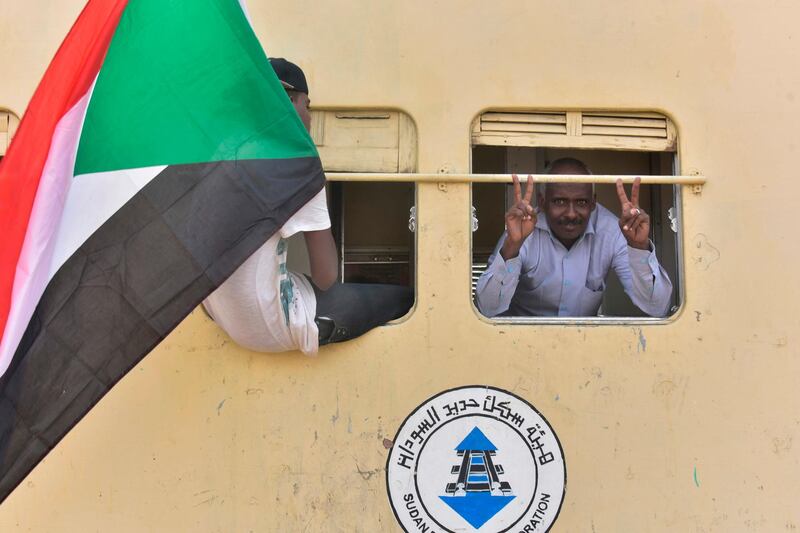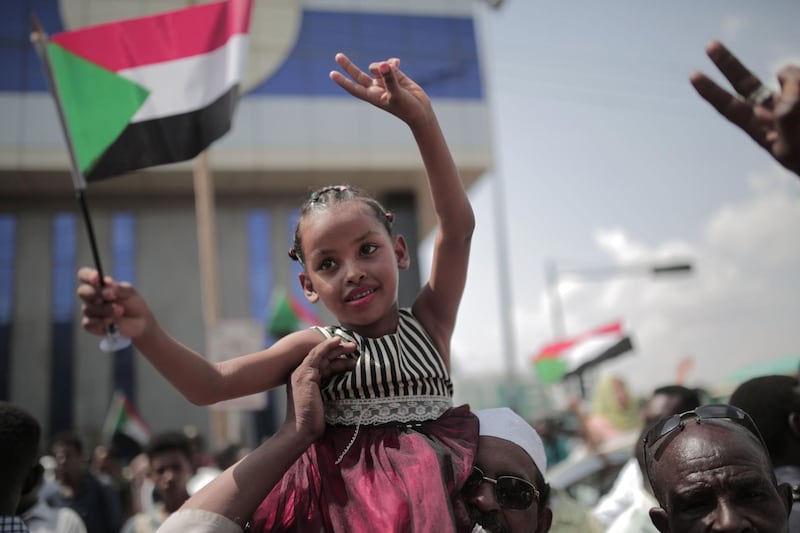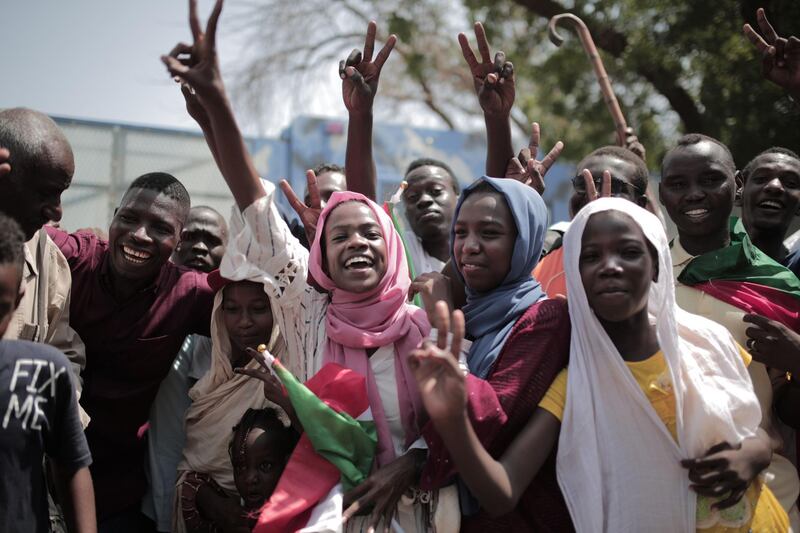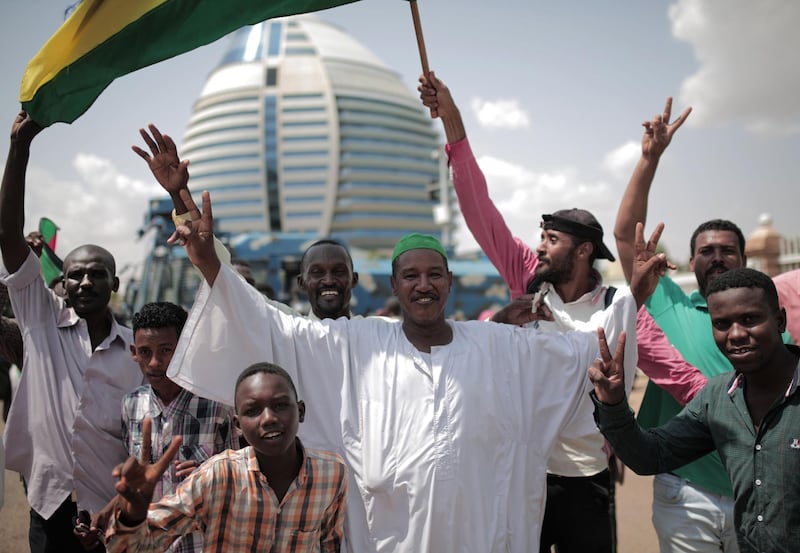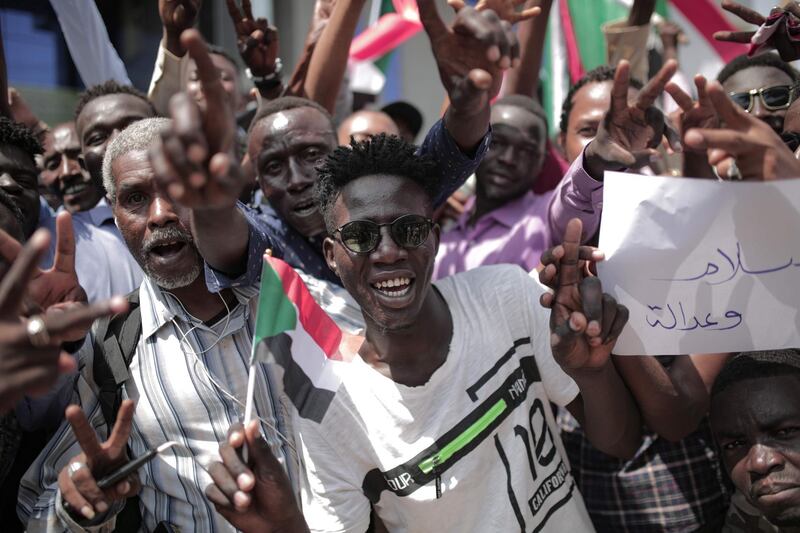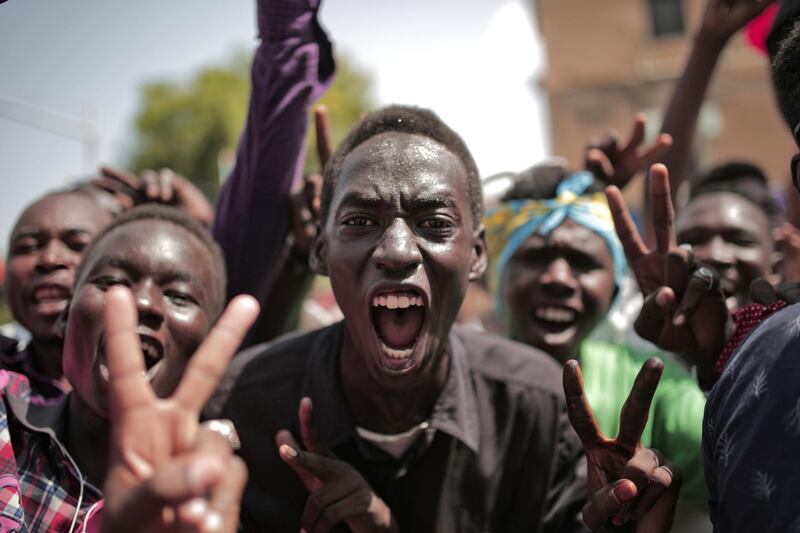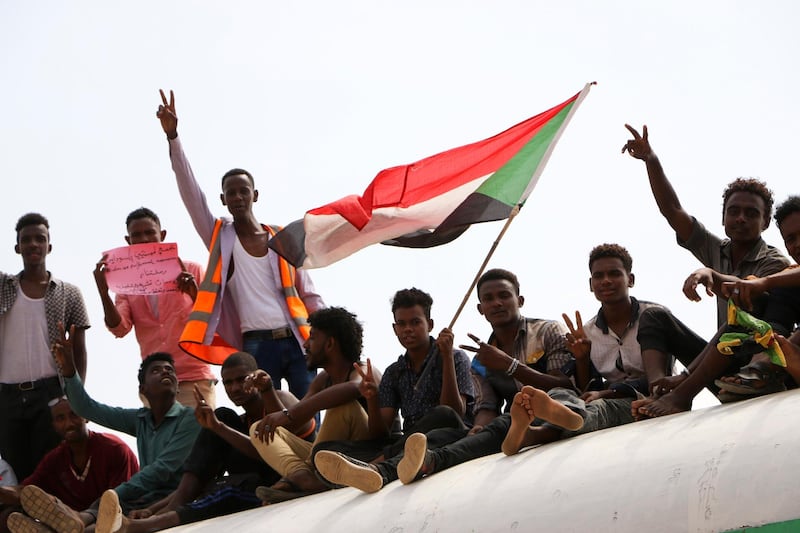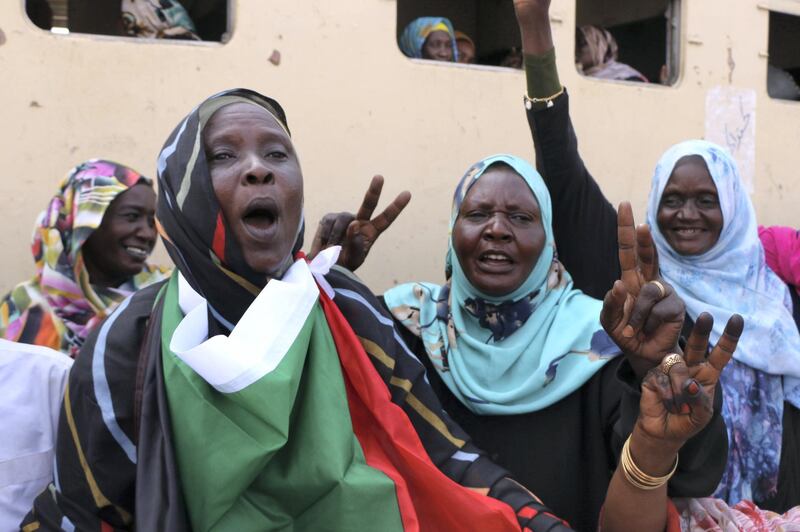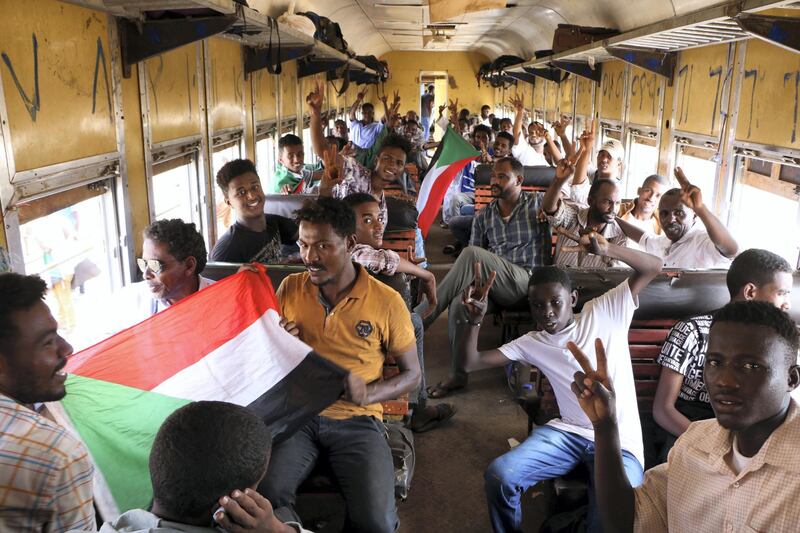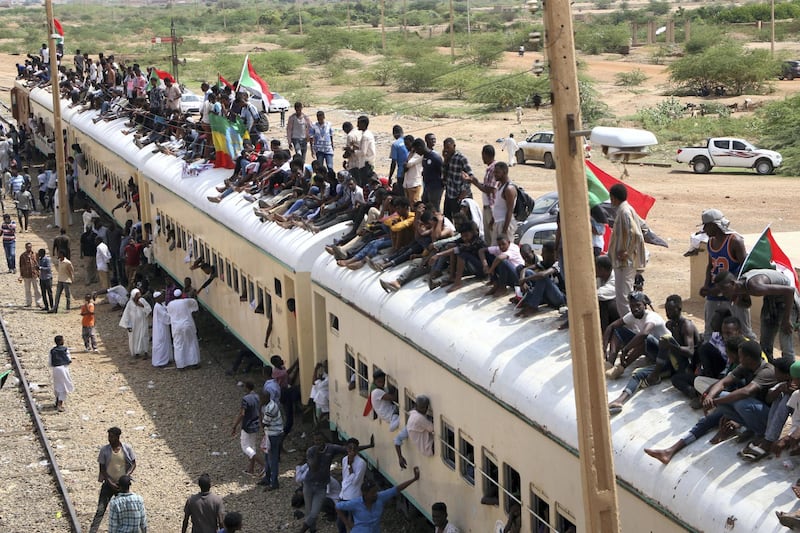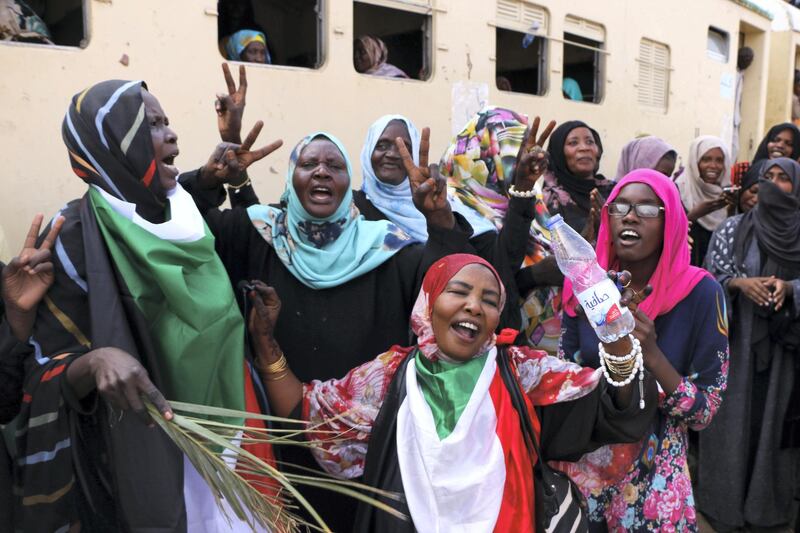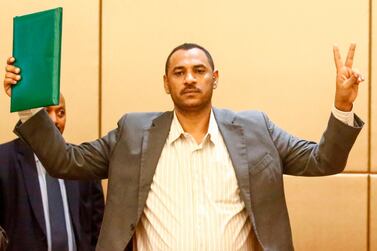Sudan marked a historic moment on Saturday with the official signing of a power-sharing agreement that should steer the country away from military rule and towards democracy over the next 39 months.
The three-hour ceremony at Khartoum’s Friendship Hall showed jubilation and optimism mixed with glimpses of the daunting tasks facing the vast country during a transitional period before elections in 2022.
Representatives of Sudan’s protest movement that led the uprising against longtime dictator Omar Al Bashir four months ago formally signed the deal with the generals who have governed since April.
At times, the ceremony resembled an opposition rally.
The decorum expected on such a day gave way to chants by activists demanding civilian rule or retribution for victims of months of deadly street protests before Mr Al Bashir's removal on April 11.
“Our people today are entitled to boast that they never surrendered or waved the white flag,” Nagi Al Asaam, a senior protest leader, told the ceremony.
Mr Al Asaam pledged not to exact revenge on cronies or officials associated with Mr Al Bashir’s regime, calling on those who did not commit crimes to join the journey to rebuild the nation.
“We will not do what you did,” he said, referring to years of human rights abuses, corruption and suppression of freedom under the Bashir regime.
Mr Al Asaam also held an olive branch to rebels in regions in western and southern Sudan, asking them to lay down their arms and enter negotiations.
Rebel leaders have criticised the power-sharing deal and complain that they have been excluded from the negotiations to draft the document.
“Peace is the choice of every rational man,” Mr Al Asaam said.
The 18-page document spelling out how Sudan would be ruled until November 2022 was signed by protest leader Ahmed Rabia, 42, a high school maths and physics teacher.
Mr Rabia is one of the co-founders of an alliance of professional unions that orchestrated the revolt against Mr Al Bashir.
The other signatory was Gen Mohamed Dagalo, deputy chairman of the Transitional Military Council.
The two men signed the document as leaders and senior officials from Arab and African nations watched on, including Dr Sultan Al Jaber, UAE Minister of State.
The prime ministers of Ethiopia, who had helped to keep negotiations moving, and Egypt were invited to sign the document as witnesses.
Mr Rabia and the chairman of the Transitional Military Council, Gen Abdel Fattah Al Burhan, jointly held the document and triumphantly raised it above their heads to thunderous applause.
Thousands of people gathered outside the Friendship Hall, waving Sudan’s red, white, green and black flag and chanting slogans welcoming the agreement as a prelude to democracy.
Elsewhere in the city, streets were filled with revellers, motorists hooted and men and women in the back of pickup trucks sang and ululated.
Held under tight security, the ceremony called “Joy of Sudan” began with many of 1,000 people packed into a large conference room enthusiastically singing the national anthem of Sudan, played by a military band.
They flashed the “V” for victory sign and screamed “madaniyah,” Arabic for civilian, a popular chant first used to press demands for civilian rule after the military removed Mr Al Bashir.
Many of the Sudanese attending the ceremony also chanted, “Our martyrs never died, they live on with the revolutionaries", a tribute to the hundreds who lost their lives since protests against Mr Al Bashir’s rule began in December last year.
Sudan has since independence in 1956 seen a vicious cycle of military dictatorships and freely elected governments, both failing to bring peace to the country, establish a stable political system or lay the foundations of a functioning economy.
Those failures often made it look like a nation tearing itself apart.
The constitutional document signed on Saturday has the potential to put Sudan on the path to enduring stability.
But the road is fraught with challenges including a battered economy, institutional corruption and a “deep state” of Mr Al Bashir's loyalists keen to sabotage attempts at reform.
Saturday’s ceremony came eight months after anti-government demonstrations first broke out, initially to protest against price rises and shortages of necessities, but soon escalating to demands for Mr Al Bashir to step down.
The protesters were met with a deadly response by security forces and militias loyal to the leader, but they continued unabated.
At least 300 people have been killed in the uprising and its aftermath, including nearly 130 on June 3, after Mr Al Bashir was removed.
That day, security forces moved to break up a sit-in encampment, claiming criminals were using the site outside the headquarters of the armed forces in Khartoum.
The document signed on Saturday has a distinctly progressive tone, emphasising that the pillars of the new Sudan are justice, equality and diversity.
It also guarantees freedom and human rights.
The agreement states that the first six months of the 39-month transition will be focused on resolving the long-running conflicts in the west and south of the country.
Significantly, it places the powerful Rapid Support Forces paramilitaries under the command of the sovereign council leader.
The 11-member council will act as a collective presidency.
The document was reached after months of difficult negotiations marred by bouts of deadly violence by security forces against protesters pressing for civilian rule.
A military member, probably Gen Al Burhan, will lead the council for 21 months followed by a civilian for the remaining 18 months of the transition.
For its council representatives, army has also nominated his deputy Gen Mohammed Dagalo, and Lt Gen Yasser Al Atta, the military council's spokesman told Sky News Arabia on Saturday.
The military's two remaining members will be named at a later time, Lt Gen Shamseldin Kabbashi said.
Ten of the council’s seats will be divided equally between civilians and the military. The eleventh member will be a civilian jointly selected by both sides.
The document also includes a government of technocrats and a legislature in which the Forces of Freedom and Change, an alliance of political parties and trade unions that led the uprising against Mr Al Bashir, will take 200 of the chamber’s 300 seats.
At least 40 per cent of the seats will be assigned to women, a salute to their pivotal role in the protests.
The charter was praised by the foreign guests who took turns addressing Saturday’s ceremony, with many calling it a milestone in the history of Sudan and an embodiment of co-operation between the military and civilian opposition.
In the UAE, Dr Anwar Gargash, Minister of State for Foreign Affairs, said he was encouraged by the latest developments and vowed to help steer the country towards stability and prosperity.
“Lots more to do to help following decades of Bashir/Muslim Brotherhood rule,” he tweeted.
After the ceremony, Dr Al Jaber said: "The peaceful transition of power through dialogue is the most effective guarantee for the development and progress of nations, particularly as chaotic experiments have produced disastrous results on many peoples in the region.”
The UAE and Saudi Arabia, whose Minister of State for Foreign Affairs, Adel Al Jubair, was at Saturday’s ceremony, jointly pledged $3 billion (Dh11.01bn) in emergency economic aid to Sudan after Mr Al Bashir’s removal.
UN Secretary General Antonio Guterres also welcomed the signing and said he was “looking forward to engaging with and supporting the transitional governing institutions".
Mr Guterres praised the role of the African Union and Ethiopia in mediating the talks between the protest groups and the military.
